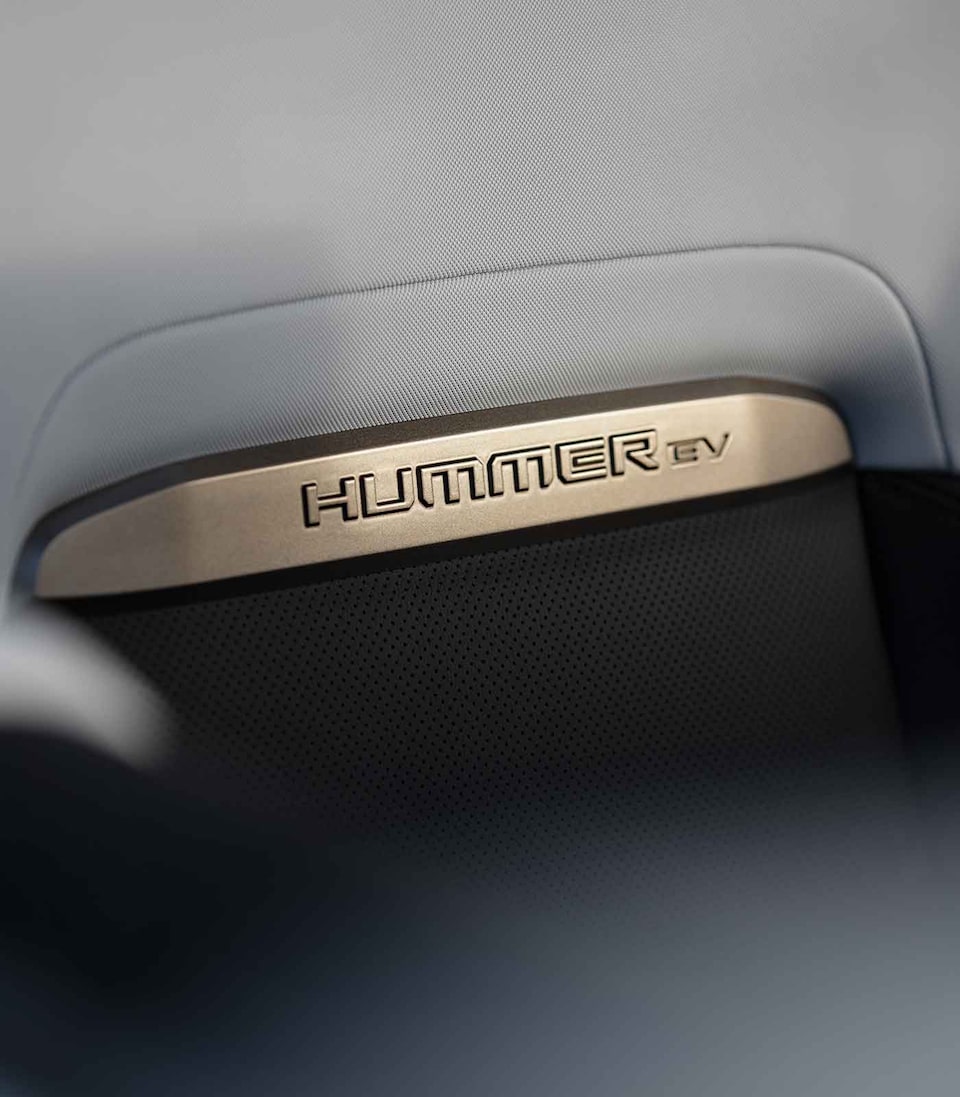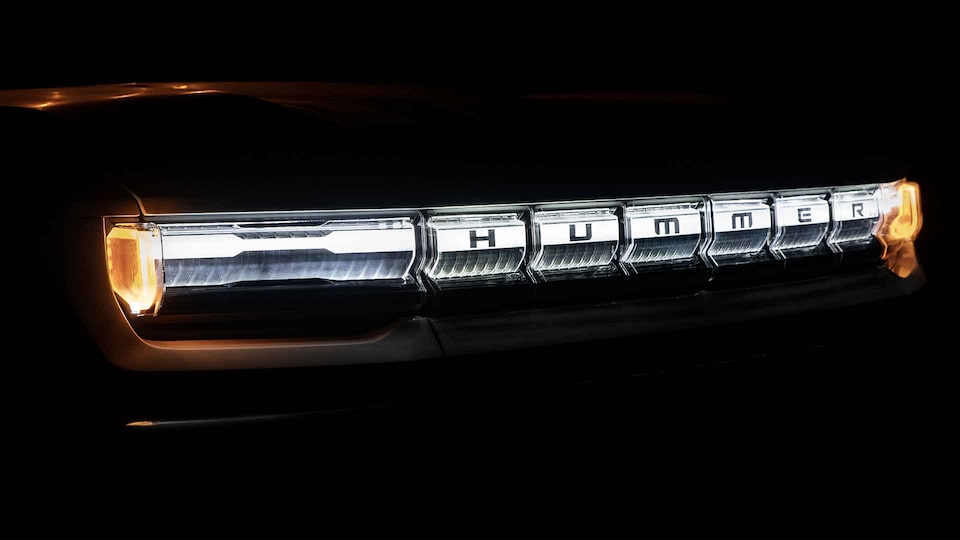
With the HUMMER EV (Edition 1 initial availability fall 2021), GMC is building on a century of innovation and engineering excellence to introduce the world’s first all-electric supertruck.
In addition, it will mark a significant step forward in General Motors’ vision of a world with zero emissions, powered by electric vehicles. The HUMMER EV will be the first vehicle from GMC to use GM’s all-new Ultium battery architecture, which will provide the framework to help integrate advanced technologies for optimal efficiency, as well as excellent performance and powerful capability.
To help explain the benefits of all-electric vehicles, here are some facts about owning and charging EVs.
Preproduction model shown with 2023 Model Year accessory wheels. Actual production model may vary. Initial availability Fall 2021.

WHY GO ELECTRIC?
Dominant performance and zero tailpipe emissions are some of the great benefits that come with EV ownership.
And to assist consumers with making the switch toward EVs, state or local authorities may currently offer tax credits to help offset a purchase or lease. The cost of buying an EV charger could even be reduced by present-day rebates, tax exemptions and credits that may be available. And currently, utility providers may offer low or reduced pricing based on the time of use when charging an EV.

Another benefit, according to the department, is how EV electric motors provide quiet, smooth operation, and stronger acceleration while requiring less maintenance than gasoline engines.
Then there’s the current financial benefit to owning an EV as a result of the reduced maintenance costs and available rebates or grants to help offset the cost of a purchase or lease. This may include current tax credits offered by state or local authorities. The cost of purchasing an EV charger could even be reduced by present-day rebates, tax exemptions and credits that may be available. And currently, utility providers may offer low or reduced pricing based on the time of use when charging an EV. For example, a utility provider may give a meaningful discount on electricity cost for consumption during the hours of 12–4 a.m.
NABÍJENÍ DOMA
There is some essential information EV owners should know about charging their vehicle.
To start, it’s important to understand the driving range for EVs is still measured in miles, but the battery charge is represented by kilowatt-hour, or kWh. This unit of measurement equates to energy storage. If you were to relate this to a vehicle powered by fossil fuels, think of it as gallons of gasoline.
The charging connector used by GMC for the HUMMER EV is the same one used by almost all major automotive companies in the United States.
Unlike fueling up vehicles with gasoline engines, owners will have the ability to recharge their electric vehicle’s battery at home when an EV is plugged in and not in use.
EVs can be recharged using either alternating current (AC) or direct current (DC), receiving power that is measured in kilowatts (kW). The power that comes from the energy grid is AC because it is easy to transmit over long distances. However, the advantage of DC is that it is easy to store in batteries, which is why it is used in portable electronics and EVs. When you plug your EV in to charge at home or at work, the AC current that comes from the power grid is converted into DC by the vehicle’s converter.
The time required to charge an EV is dependent upon the type of charging that is available and the specifications of the vehicle. To learn more about the three levels of charging † , visit the U.S. Department of Energy website.
However, with 800-volt public DC fast charging, the HUMMER EV Edition 1 (also available on HUMMER EV 3X ) will have the ability to use 350-kilowatt DC fast chargers † that enable nearly 100 miles of range in 10 minutes of charging † based on GM estimates.
Currently, GMC is working with Qmerit to help customers find AC Level 2 at-home charging station installers in their area if they would like a faster home charging option.
Preproduction model shown. Actual production model may vary. Initial availability Fall 2021.
The original Hummer was a beast of a truck. But, the electric Hummer is a whole new level of awesome, all thanks to some seriously cool tech.
It blows my mind that we have an electric Hummer nowadays, considering that not too long ago, these bad boys were infamous gas-guzzling, pollution-spewing monsters.
Take the H1 Hummer, for example. It only gets 10 miles per gallon of gas and tips the scales at a whopping 8,000 pounds. In contrast, a Ford F-150 truck weighs a mere 4,000 to 5,000 pounds.
Now, let’s talk about the Hummer EV. I wanna dig into the electrifying engineering behind some of its components. Yeah, the Hummer EV still resembles a brick and isn’t aerodynamically sleek, but you can’t ignore the insane power GM has packed into this ride. With cutting-edge battery tech, the Hummer EV has transformed into an eco-friendly beast of a machine.
So, can the Hummer EV really reinvent itself and rock a new image? Let’s see what it’s got by diving into some thrilling topics:
- Specifikace výkonu
- Náklady na nabíjení
- Dojezd
- Rychlosti nabíjení
Hummer EV power specs

The electric Hummer boasts an e4WD system juiced up by three electric motors—one up front and two in the back. Each motor has a 250 kW rating, pushing this beast to a max power output of 750 kW, or around 1,000 horsepower!
Now, hold your horses (pun intended) because that peak 1,000 HP isn’t something you can use all the time. It’s only available for short, exhilarating bursts when you engage the “Watts to Freedom” mode. So, if you’re itching to go from 0 to 60 mph in an insane 3 seconds, that’s when you’ll really feel the power!
But what really grabs my attention is the Hummer’s battery setup.
The battery system calculation
You might be wondering: how does something as massive as a Hummer glide so smoothly? The secret sauce? A ginormous battery, of course!
Let’s get up close and personal with the Hummer’s battery system. The Hummer EV houses a total of 576 cells, figured out by multiplying 24 cells by 24 modules. Each battery cell packs about 100 Amp-hours, meaning the whole battery system’s got a capacity of 57,600 Amp-hours (Ah).
Now, don’t forget that Amp-hours multiplied by Volts equals Watt-hours (Wh). We’re just using the P = VI formula here, where P is power measured in watts. For reference, 1,000 Watts equals 1 kilowatt (kW), and we measure battery energy storage in kWh.
Assuming the nominal voltage of a lithium-ion battery is 3.60 volts per cell, the math goes like this: 57,600 Ah x 3.6 volts = 207,360 Wh or a stunning 207.4 kWh!
To give you an idea of how massive a battery pack rating of over 200 kWh is, here’s a comparison with other EVs:
| Elektrické vozidlo | Battery usable | Rozsah | Fully charge cost | Cena za míli |
|---|---|---|---|---|
| Hummer EV (tri motor) | 207.4 kWh | 350 míle | $32.66 | $0.093 |
| Cybertruck (tri motor) | 200 kWh | 500 míle | $31.49 | $0.063 |
| Model 3 (Long Range) | 82 kWh | 353 míle | $12.91 | $0.037 |
| Model S (Long Range) | 90 kWh | 412 míle | $14.17 | $0.034 |
| Model X (Long Range) | 90 kWh | 360 míle | $14.17 | $0.039 |
| Model Y (Long Range) | 72.5 kWh | 326 míle | $11.42 | $0.035 |

Důležitá poznámka: GM rigged up 12 battery modules, creating a 400-volt battery pack. Then, they hooked up two 400-volt packs in parallel, adding up to 24 battery modules in total.
Hummer EV charging cost
Charging an electric vehicle’s cost hinges on the typ nabíječky you plug into. So let’s stack Level 2 and Level 3 chargers against each other.
First up, let’s roll with an average electricity rate of 13.7 cents per kWh from February 2021. We’ll use this rate to figure out the cost of fully charging the Hummer EV at home, assuming a charger efficiency of 0.87.
(207.4 kWh / 0.87) x $0.137 per kWh = $32.66
Dále Tesla’s Supercharger runs about $0.26 per kWh. So we can safely bet that the cost to juice up the Hummer EV on any other DC Fast charger would be in the same ballpark.
(207.4 kWh / 0.87) x $0.26 per kWh = $61.98
To put these costs into perspective, let’s see how they measure up to the expense of fueling a gas-thirsty Hummer.
| Vozidlo | Charger/Fuel type | Batter/Tanks size | Cost of fuel (2021) | Full fueling cost | Cena/míle |
|---|---|---|---|---|---|
| Hummer EV (350 mile range) | Nabíječka úrovně 2 | 207.4 kWh | 0.137 $ / kWh | $32.66 | 0.09 $/míle |
| Hummer EV (350 mile range) | Nabíječka úrovně 3 | 207.4 kWh | 0.26 $ / kWh | $61.98 | 0.18 $/míle |
| Hummer H1 (250 mile range) | motorová nafta | 25 galonů | 3.249 $ / galon | $81.23 | 0.32 $/míle |
| Hummer H2 (320 mile range) | Prémiový benzín | 32 galonů | 3.028 $ / galon | $96.90 | 0.30 $/míle |
| Hummer H3 (322 mile range) | Prémiový benzín | 23 galonů | 3.028 $ / galon | $69.64 | 0.22 $/míle |
As you can see, driving an electric Hummer instead of the old gas-guzzlers can save you a pretty penny. But remember that the electric Hummer’s purchase price may eat into those savings over time.
Breakeven cost comparison between a Hummer EV and Hummer H3
The “Edition 1” Hummer EV truck slaps a price tag of about $106,000, while a solid used 2006 H3 Hummer with 20,000 miles goes for roughly $25,000. That’s a jaw-dropping cost difference of $81,000!
Now let’s say you drive 13,500 miles a year, which is the average number of miles driven per year in the U.S., according to the Katedra dopravy.
Čas na trochu matematiky.
Hummer EV: 13,500 miles x $0.09 = $1,215 per year
Hummer H3: 13,500 miles x $0.22 = $2,970 per year
So, the annual cost gap between the Hummer H3 and EV comes to around $1,755. But to break even on the upfront cost difference of $81,000, it would take a staggering $81,000 / $1,755 = 46 years!
Of course, there’ll be other maintenance costs tied to a used H3 Hummer. However, the main takeaway is that cost savings usually aren’t the main reason people would buy a Hummer EV. Most folks who spring for a Hummer EV are after a badass cool, rugged EV!
To learn more about electric vehicle charging costs, read zde.
Hummer EV driving range

GM has been tossing around a driving range of 350 miles for this monstrous machine, which trumps the range of its gas-chugging ancestors like:
The Hummer EV has a slight advantage, but before we start comparing apples to oranges, let’s remember that the weight of these models can majorly impact the range.
Now, let’s pit the Hummer EV against other popular electric vehicles. Scope out the table below for the driving range of famous EVs, including the Tesla Cybertruck. Keep in mind that the estimated charging costs are based on using Level 2 chargers.
| Elektrické vozidlo | Battery usable | Rozsah | Fully charge cost | Cena za míli |
|---|---|---|---|---|
| Hummer EV (tri motor) | 207.4 kWh | 350 míle | $32.66 | $0.093 |
| Cybertruck (tri motor) | 200 kWh | 500 míle | $31.49 | $0.063 |
| Model 3 (Long Range) | 82 kWh | 353 míle | $12.91 | $0.037 |
| Model S (Long Range) | 90 kWh | 412 míle | $14.17 | $0.034 |
| Model X (Long Range) | 90 kWh | 360 míle | $14.17 | $0.039 |
| Model Y (Long Range) | 72.5 kWh | 326 míle | $11.42 | $0.035 |
It’s no shocker that the Hummer EV isn’t the most efficient ride on the list. I mean, it’s a beast of a machine and doesn’t exactly cut through the wind. It’s got a massive weight and a not-so-great drag coefficient.
But get this: If GM managed to trim the Hummer EV’s weight, they could potentially boost its driving range to nearly 500 miles! Of course, that’d mean ditching the iconic design we all know and love.
Hummer EV charging speed
We already know the Hummer’s battery design rocks two 400-volt packs connected in parallel. But what’s super rad is that you can plug it into an 800-volt charger!
This is doable because the Hummer’s internal electrical components rejig themselves, hooking up the two 400-volt battery packs in series. When batteries connect in series, their voltage stacks up, so in this case, 400V + 400V = 800V.
With an 800V DC fast charger rated at 350 kW, you can pull about 250 amps, letting you juice up your Hummer in a flash. Using the charge time formula, we can crunch these numbers:

















